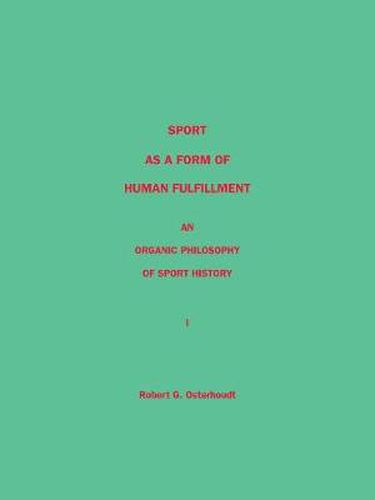Sport as a Form of Human Fulfillment: An Organic Philosophy of Sport History
Robert G. Osterhoudt

Sport as a Form of Human Fulfillment: An Organic Philosophy of Sport History
Robert G. Osterhoudt
This title is printed to order. This book may have been self-published. If so, we cannot guarantee the quality of the content. In the main most books will have gone through the editing process however some may not. We therefore suggest that you be aware of this before ordering this book. If in doubt check either the author or publisher’s details as we are unable to accept any returns unless they are faulty. Please contact us if you have any questions.
The principal subject of this modest manuscript is sport. Few subjects are at once more widely acclaimed, touch the popular imagination more deeply, but are less earnestly studied than sport. What little reflective thought has been devoted to the subject has been of a largely scientific (as distinct from a humanistic) type. Most of this thought concerns the biological, psychological, or sociological character of the activity as against its historical or philosophical dimensions. Although rarely spoken of in exacting historical or philosophical terms, an authentic understanding, appreciation, and practice of sport nonetheless depend necessarily on accounts that show its origin and development (on historical accounts) as well as on accounts that reveal its essential nature and purpose (on philosophical accounts). Together, historical and philosophical interpretations of sport – the so-termed humanistic perspectives of sport – demonstrate the basic place of sport in human life, the basic place of sport in the full relief of human experience as such. These accounts disclose what sport has been and what it is ultimately for. They reveal the grounding charms of sport in distinctly human terms and they also illumine the wider character of humanity itself (insofar as humanity has expressed itself as persistently as it has in sporting terms). Humanistic interpretations of the sort here advocated demonstrate both that sport forms an integral aspect of human experience and that it is also a fundamental expression of that experience. In the creative flow of human activity, sport has had a conspicuous (if a formally neglected) place and it therefore figures importantly in any serious examination of genuine human experience. The purpose of this manuscript is to show, in broad overview, the origin, development, nature, and purpose of sport from its first appearance in the ancient primitive world to its elaborate place in contemporary modern civilization; to give a systematic and comprehensive account of sport as a function of the cultural events that have embodied it throughout its occasion in human affairs; and to do all of this under the interpretive gaze of an organic world view. The result is a synthetic summary of the accomplished historical and philosophical literature’s collective judgment concerning sport in the wide context of human culture from the perspective of the organic thesis. The result is an organic philosophy of (world) sport history in which the essential factors (the characteristic and decisive factors, the dominant tendencies) concerning the origin, development, nature, and purpose of human culture and its sporting attributes are dutifully recounted and reflectively interpreted. According to the organic sense of life and sport, it is only by way of such a result that sport can be plausibly connected to the end of distinctly human experience and that human life itself can be waged in full accord with its own most basic and endearing tendencies.
The text works principally off of the encyclopedic and humanistic orientations of Hegel’s organic metaphysics and philosophy of history. It thus begins with an account of the development of the physical world and of life in its various forms. It then turns to an examination of the origins and development of human culture in the ancient, medieval, and modern periods with special attention to sport. The governing argument of the text concludes that it is in the organic inclinations of the ancient, medieval, and modern eras that sport comes to its highest realization; it is in these inclinations that sport: overcomes the stylish claims against it as a plastic thing (among other plastic things) that secures strictly instrumental aims; acts in full accord with its own basic nature and purpose, with its own fundamentally playful nature and purpose; gets linked to the mainstream of human life and contributes meaningfully to the living of an authentically human existence;
This item is not currently in-stock. It can be ordered online and is expected to ship in 7-14 days
Our stock data is updated periodically, and availability may change throughout the day for in-demand items. Please call the relevant shop for the most current stock information. Prices are subject to change without notice.
Sign in or become a Readings Member to add this title to a wishlist.

